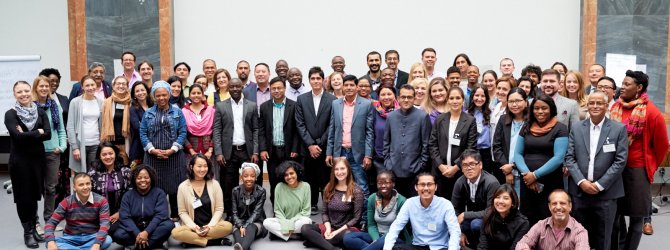-
Legal Empowerment through Cultural Understanding
Legal Empowerment through Cultural Understanding

Afro-American poet and civil rights activist Maya Angelou once said that “perhaps travel cannot prevent bigotry, but by demonstrating that all people cry, laugh, eat, worry, and die, it can introduce the idea that if we try and understand each other, we may even become friends”.
In the first half of October, I had the pleasure of participating in two seemingly very different events. First there was the Namati and Open Societies Foundations’ Legal Empowerment Leadership Course, held at the Budapest School of Public Policy. Shortly after, I was honoured to speak at a conference in Cassino, Italy, held by CamMiNo, the Italian Lawyers’ National Association for the Family and Minors, presenting on the history of Islamic family law, and my experience in women’s legal empowerment in Jordan.
Most of the participants of the legal empowerment course were young (if not in age, definitely in spirit), passionate activists and practitioners wanting to make a change in their own country in a vast diversity of fields, such as indigenous rights, right to health, land rights, women’s rights, or legal awareness and advocacy. While each one of us concentrated on a specific issue, I found that everyone was open to listen to other experiences, even when they were not directly related to their own areas of interest. For example, despite my focus on Jordan, and on women’s issues, I found myself learning and discussing land rights in the Philippines and health rights in Moldova. And while, on the surface, these issues seem to have nothing in common, I was surprised to notice how methodologies and legal strategies can be similar to one another and offer hints towards how to elaborate new ones.
At the conference in Cassino, participants were not a multicultural group of activists and paralegals, but an assembly of experienced Italian lawyers, all specialised in family law and protection of minors in Italy. My panel, made up of myself, lawyers from Algeria, Spain, France and Poland, was tasked with explaining the challenges lawyers face in protecting family relations in countries other than Italy. I was the first one to present. My nervousness, both for being the only non-lawyer and the youngest person in the room, was soon overcome by the realisation that everyone seemed extremely keen to hear what I had to say. Here too, like Budapest, the participants were eager to learn about new cultures, different experiences and issues, and strategies to deal with them.
So these two events, apparently so different in nature, had somehow a common feature. In the end both were about promoting cultural encounters, about helping to create a better understanding of shared problems and developing the tools to come up with shared solutions. For the legal community, this looks like a paradigm shift, suggesting the abandonment of its traditionally inward-looking, watertight approach in favour of opening up to search for allies and strategies in different fields, with different expertises and backgrounds. The need to interact, cooperate and understand “the other” is becoming stronger and stronger. Not only because we are increasingly valuing other cultures and what we can learn from them, but also because globalisation and migration have made those “others” become our clients, our colleagues, our neighbours.
My hope is to see more and more of these events in the future, gatherings of different cultures perhaps not to prevent stereotypes and bigotry, but, like Angelou said, to work together and understand each other, and maybe even become friends.

